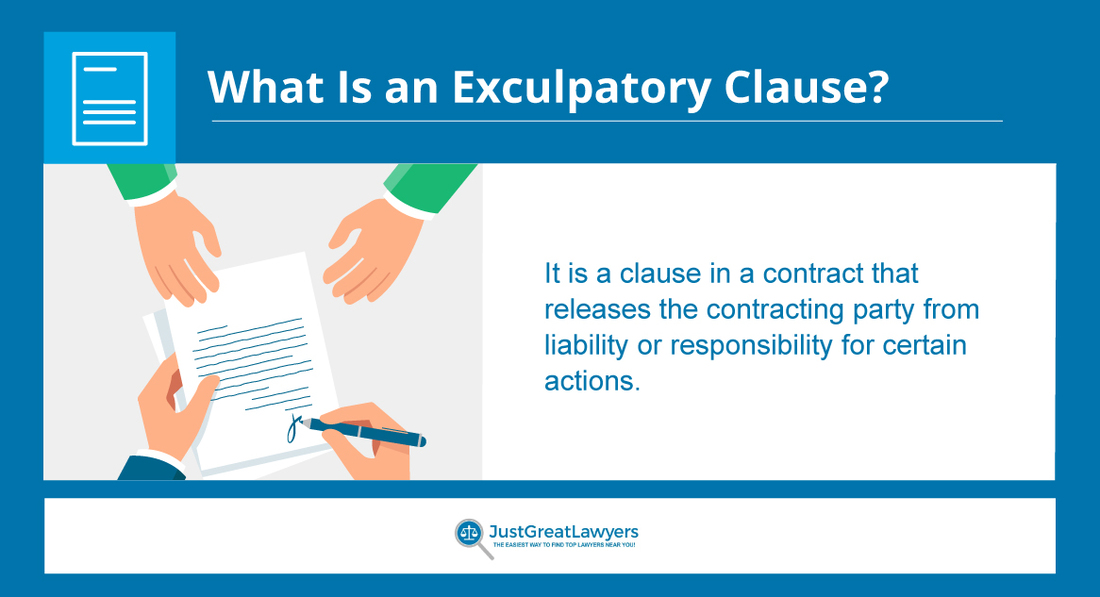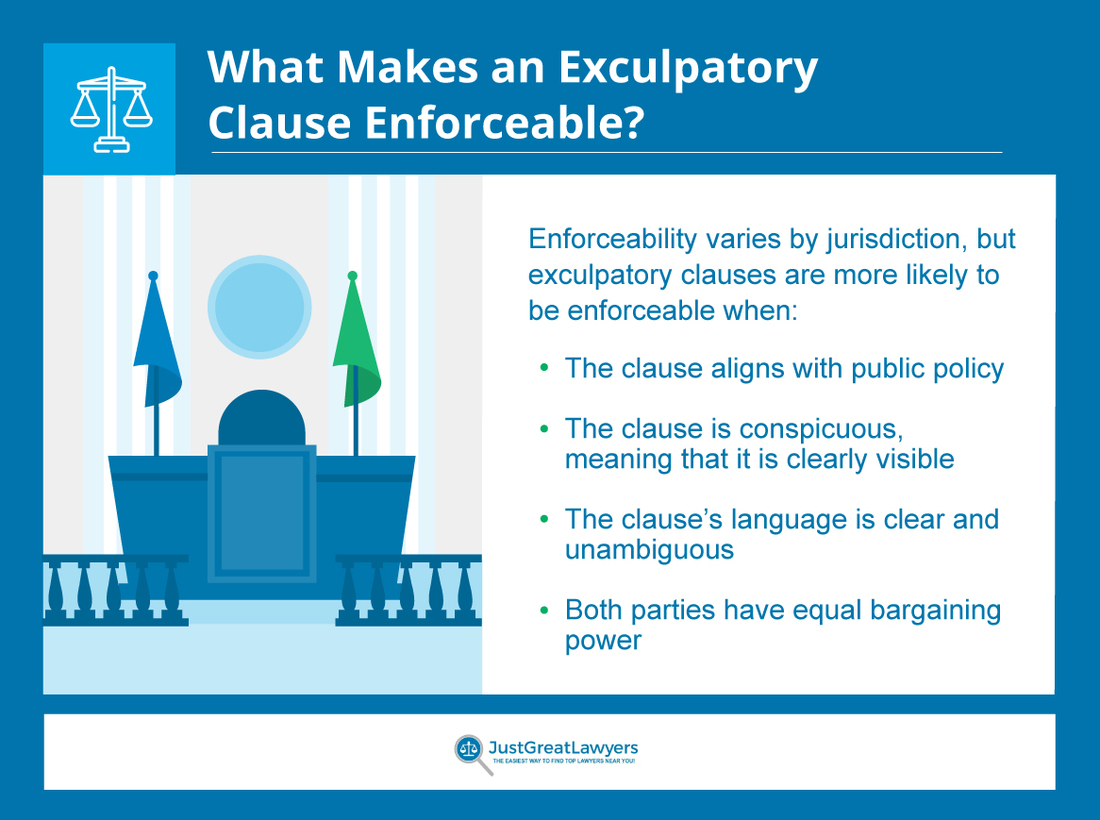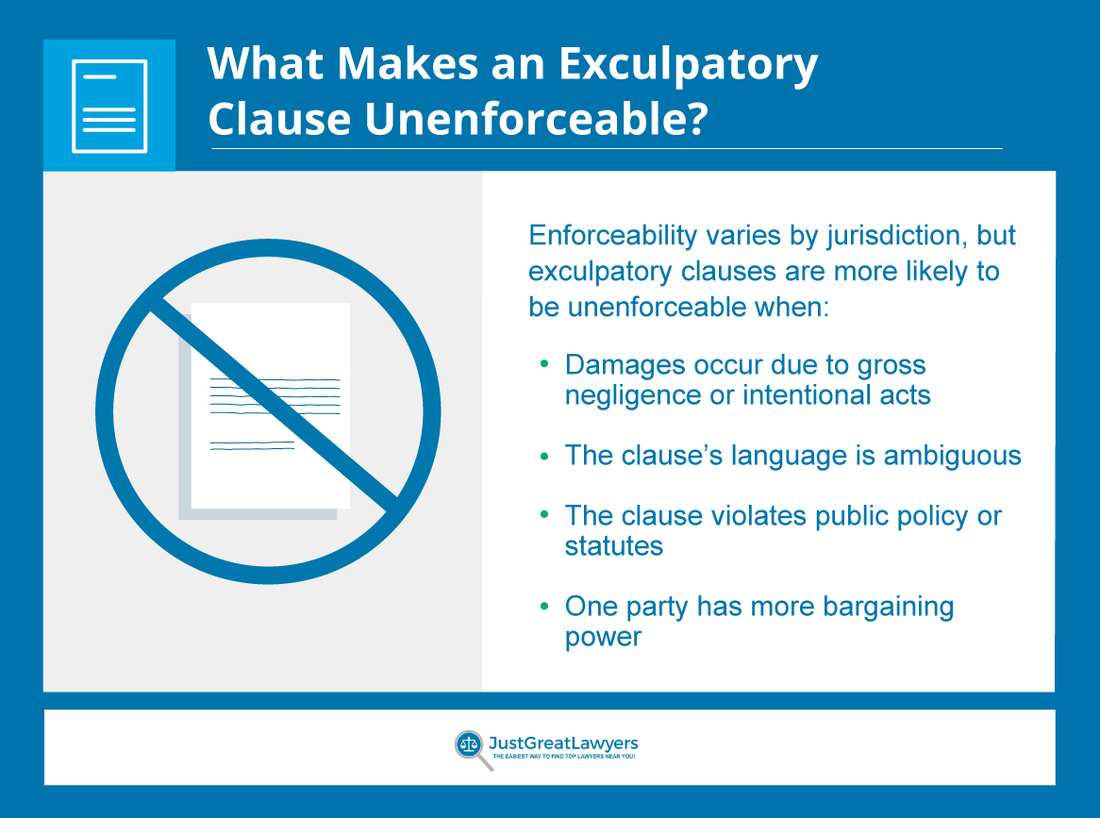

An exculpatory clause protects one contracting party from liability for damages that may occur during the execution of the contract. Whether or not it is enforceable depends on multiple factors including whether the exculpatory clause follows public policy, which is determined by statutes in each state. For example, an exculpatory clause may not be enforceable if gross negligence is shown. On the other hand, it may be enforceable if a participant knowingly took part in a risky activity.
This article covers what an exculpatory clause is, clause examples and information about what makes an exculpatory clause enforceable.

An exculpatory clause relieves one contracting party of liability for harm. Many contracts, wills and trusts include exculpatory clauses designed to shield certain parties from claims of negligence or wrongdoing. You probably are familiar with the common exculpatory language that agrees not to blame the company for injuries occurring during risky activities like skiing or rafting.
Public policy in your state may not allow exculpation (release of liability) for negligence, but the law may release liability for the inherent risks of an activity. When draftin g an enforceable exculpatory contract, you must clearly specify the inherent risks of the activity and have proof that the participant knew of those risks when entering into the contract.
Exculpatory clauses are included in many types of agreements, including the following:
Whether or not we’re always aware of it, we are surrounded by examples of exculpatory clauses every day. Signs posted near pools warn users to swim at their own risk. A triathlon organizer may require participants to sign a release of liability before they can compete. When you buy a ticket for a haunted house at Halloween, you may be asked to agree to hold the organizer harmless for any claims.
Here are some common places you encounter exculpatory clauses:

The enforceability of exculpatory clauses will vary based on a few elements: your jurisdiction, the exact wording of the contract and the specific scenario which led to the claim. Exculpatory clauses typically receive more scrutiny because they limit the liability of one party, usually the one drafting the agreement.
The Restatement of Contracts and case law provides principles that can be applied to exculpatory clauses. They are more likely to be enforceable if:
Every case will be different and the enforceability of exculpatory provisions depends heavily on your jurisdiction and recent precedents. However, as a general rule, enforceable exculpatory clauses tend to have several factors in common: they use clear and unambiguous wording, they are highly visible, they align with public policy and they don’t unfairly favor the party with superior bargaining power.
The enforceability of exculpatory clauses is at the heart of the case, Brigance v. Vail Summer Resorts, which occurred in Colorado, a state in which public policy has a fairly tolerant view of exculpatory clauses for recreational activities.
Dr. Teresa Brigance, the plaintiff, fractured her femur at Keystone Mountain Resort when her ski boot was wedged between the ground and the chairlift while the chairlift continued moving. However, although she signed a waiver before taking her ski lesson and her ski lift ticket included a waiver on the back, Dr. Brigance sued the resort for multiple claims of negligence.
The court examined all the ways in which an exculpatory agreement would be ruled unenforceable and held that the waiver Dr. Brigance had signed before participating in the lesson as well as the waiver on the back of the lift ticket were enforceable.
The court granted summary judgment in favor of Vail Summit Mountain Resort. The court found that the waivers didn’t violate public policy, the recreational skiing wasn’t a necessary or essential activity, the contract was fairly entered into since Dr. Brigance had a choice to not take the lessons or ski and the intent of both parties was clearly and unambiguously expressed.

Although it varies from state to state, exculpatory clauses are typically unenforceable if one party was grossly negligent, the clause was unclear or illegal activity was involved.
Exculpatory clauses are typically unenforceable if:
For legal advice on specific cases and scenarios, check with an attorney who is well versed in contract law in your state.
Again, while cases vary by jurisdiction, recent precedents and specific details, enforceable exculpatory clauses have a few characteristics in common. They must use clear, unambiguous language, be highly visible, not go against public policy and not have patently unfair provisions between two clearly unequal parties. An example of an exculpatory clause that was ruled unenforceable occurred in Fisher v. Stevens, which took place in Louisiana.
While working on a wrecker crew at Speedway of South Carolina, Fisher signed a release to access the pit area and did not pay admiss ion. During a race, the wrecker Fisher was sitting on responded to a crash and he fell off, suffering serious head injuries. Fisher sued for negligence, gross negligence and recklessness, but Speedway claimed that the release he had signed protected them. In this case, the court ruled that the exculpatory clause violated public policy, making it unenforceable.
The court partially granted summary judgment in Fisher's favor against the driver and owner of the wrecker, but denied summary judgment to Speedway, finding an issue of material fact regarding whether Fisher was an employee and whether the release was valid.
While exculpatory clauses are valid in South Carolina, they are not favored by the law. However, the enforceability of exculpatory clauses will vary based on your jurisdiction and the specific facts of your case.
The language of an exculpatory provision must be carefully considered and written to be enforceable. When preparing an exculpatory clause, it should meet the following criteria:
Again, the exact requirements vary by state, with some states requiring specific words and others focusing on the intent of the parties.
Contracts are an essential part of many businesses and industries, from real estate to intellectual property. If you need to prepare an exculpatory contract or provision, an attorney can help you navigate the laws in your state.
While good exculpatory clauses share some basic elements, their enforceability depends greatly on your jurisdiction and the specific scenarios involved. That’s why careful wording and specific state knowledge are essential.
If you need assistance writing up a contract or you have a lawsuit involving an exculpatory clause, check out Just Great Lawyers to find an attorney near you.